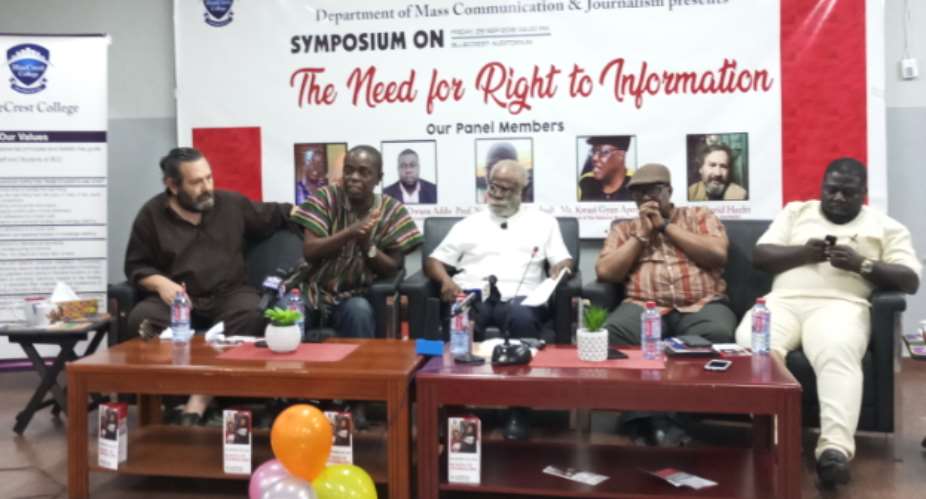The Managing Editor of the Insight Newspaper, Kwesi Pratt Jnr has said inspite of the proposal to pass the Right to Information into law, journalists ought to develop the skills and art of obtaining relevant information from private and public institutions.
He noted that although the Right to Information (RTI) Law seeks to democratize information not only to journalists but to all citizens including teachers, researchers, statisticians, state investigative bodies and the security agencies.
According to the Ace Journalist, a lot of effort and competencies is required to interpret very technical information which sometimes becomes an impediment.
He recounted how renowned journalists in the past were able to develop the skills and art of obtaining very sensitive information from very tight-grip hands mostly based on trust.
Kwesi Pratt however intimated that some vast majority of journalists in the country have become highly irresponsible and mischievous in the manner and way they go about in the profession making it difficult for whistle blowers to entrust us with very vital information.
According to him, the Right to Information (RTI) law is key to enhance citizens demand for transparent and accountability by minimizing bribery and corruption among government officials.
Kwesi Pratt worry, is however, the capacity and competency of journalists and individuals who seek such vital information such that they do not undermine the peace and security of this country.
He added that tensions ought to managed in this country most importantly on the nature of information, the competency of the handlers of such information, the medium of transmission, the period and time such that it does not destabilize peace of this country.
Kwesi Pratt said this at a symposium on “The Need for Right to Information” organized by the Department of Mass Communication and Journalism of the BlueCrest College in Accra.
The Chairman of the National Media Commission (NMC), Nana Kwasi Gyan-Apenteng said the RTI law strives to eliminate the constraints that often allow certain public officials to hide certain vital information from the public.
He noted that access to information is a fundamental right however, the passage of the RTI to create access is whether or not is itself an enabler for citizens to access information.
The veteran journalist added that there must be a custodian of the RTI law by an institution that will oversee the operationalization of the law in order that it does not become a while elephant.

“In the broad stream of institutions, none of them has the business of being the custodian of the RTI law. Discussions pointed to Attorney General’s Department but that conversation has been shelved somewhere,” he stated.
Nana Gyan-Apenteng added that the RTI is anchored on certain principles making it difficult for certain information required by the public to be made available because its sensitivity.
“Even with the Act, there are still social morals of people that will continue to exist. For instance, even though we all have the right to speech but you cannot shout fire in a cinema or a large conference room for fear of stampede. Similar can be applied to the RTI law such that the time and medium to release may also become an impediment,” he posited.
The NMC Chairman noted that government must establish a legal framework to ensure that every information obtained by individuals or group of people is used to the benefit of the society.
According to him, in an era of politicians becoming journalists by setting up media houses, information can be distorted or used to the interest of their party.
Mr. Gyan-Apenteng emphasized that whiles he endorses the RTI law to democratize information to all manner of persons irrespective of the political affiliations or status, steps must be taken to consider the sensitivity of the information, the capability of the applicant and the medium through which the information can be used.






 We’ll protect state wealth from opaque deals – Prof Jane Naana
We’ll protect state wealth from opaque deals – Prof Jane Naana
 Mauritania president says running for second term in June polls
Mauritania president says running for second term in June polls
 I won't ever say I was a mere driver’s mate' — Prof. Opoku-Agyemang
I won't ever say I was a mere driver’s mate' — Prof. Opoku-Agyemang
 2024 polls: 'EC struggling to defend credibility'— Prof. Opoku-Agyemang
2024 polls: 'EC struggling to defend credibility'— Prof. Opoku-Agyemang
 Akufo-Addo gov't's 'greed, unbridled arrogance, unrestrained impunity, sheer dis...
Akufo-Addo gov't's 'greed, unbridled arrogance, unrestrained impunity, sheer dis...
 Election 2024: Ghana needs an urgent reset, a leadership that is inspiring – Ma...
Election 2024: Ghana needs an urgent reset, a leadership that is inspiring – Ma...
 Partner NDC to rollout a future of limitless prospects – Prof Jane Naana Opoku-A...
Partner NDC to rollout a future of limitless prospects – Prof Jane Naana Opoku-A...
 NPP will remain in gov’t till Jesus comes — Diana Asamoah
NPP will remain in gov’t till Jesus comes — Diana Asamoah
 Sunyani Technical University demands apology from former SRC president over sex-...
Sunyani Technical University demands apology from former SRC president over sex-...
 'Dumsor' was resolved by Mahama but ‘incompetent' Akufo-Addo has destroyed the g...
'Dumsor' was resolved by Mahama but ‘incompetent' Akufo-Addo has destroyed the g...
